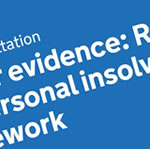Misleading DMP advice Mrs B was advised to go into a Debt Management Plan (DMP) by an IVA firm. They referred her to a firm that charges fees for running a DMP. I suggested that she should talk to StepChange or another provider that doesn't charge any fees for a DMP. Mrs B went back and queried the advice with the IVA firm. This is the WhatsApp conversation: I explained to Mrs B that … [Read more...]
Insolvency News & Policy articles
Here are all the Debt Camel articles about what is new and changing in bankruptcy, DROs and IVAs. They cover everything from news about IVA firms to statistics and regulatory changes from the Insolvency Service. These articles are mainly of interest to debt specialists.
If you want practical advice on choosing between the different insolvency options, or about what happens when you have gone bankrupt or are in a DRO or IVA look at the following:
IVA mis-selling must stop – FCA finally acts to ban debt packagers
Many people have been mis-sold IVAs when they had a better (cheaper, quicker, less risky) debt option available. These other options were ignored or not properly described by some firms that should have given proper debt advice. IVAs are the only debt solution in England, Wales and Northern Ireland that generates large fees for the firms setting them up. These fees can distort debt advice given … [Read more...]
Personal Insolvency – the urgent need for change
The Insolvency Service issued a Call For Evidence (CfE) in July 2022, asking a wide range of questions about personal insolvency in England and Wales: The purpose of this document is to seek evidence that will help inform the Government on whether the current personal insolvency framework is still fit for purpose and, if not, what reforms are needed. The CfE started by saying: What should be … [Read more...]
Help with IVAs if you can’t pay because of the cost of living
Many people in an IVA are currently struggling because of the large rises in bills and prices in 2022. The Insolvency Service has now issued Guidance to support the IVA protocol. (That is confusingly laid out - look for the section headed 60) Guidance to support the IVA protocol for existing protocol compliant IVAs: 26 June 2022.) This sets out what extra help IVA firms should provide … [Read more...]
Vanguard, The IVA Adviser, QIS – all failed in 2022
Three large IVA firms failed in 2002: Vanguard Insolvency, which was wound up in May "in the public interest; The IVA Adviser, went into administration in August; QIS went into administration in November. Vanguard was closed after being investigated by the Insolvency Service On 13 May 2022, the Insolvency Service announced that Vanguard Insolvency had been wound up "in the public … [Read more...]
More than a third of IVAs fail – and this may get worse
This post was written based on statistics published in 2022. Since then, statistics have been complicated by the special measures during COVID that temporarily prevented many IVAs from failing. Statistics published in early 2024 show: one in three (33%) IVAs that started between 2016 and 2018 failed of IVAs that started in 2022, 5.6% failed in the first year. This was about the same as … [Read more...]
Major changes for thousands of customers with Aperture & Vanguard IVAs
In Autumn 2020 two of the largest IVA firms have recently announced the latest in a long line of customer transfers within the industry: all Aperture's open IVAs have been sold to Jarvis Insolvency; and Vanguard's open IVAs will be administered by Ebenegate. UPDATE: In February 2021 Jarvis rebranded and it now calls itself Debt Movement. Sale of Aperture's IVAs to Jarvis On 5 … [Read more...]
Holding Money & Debt up to the Light: Transparency and the Standard Financial Statement
This is a guest post by Dr Joseph Spooner, Assistant Professor of Insolvency Law at the LSE and the author of Bankruptcy – the Case for Relief in an Economy of Debt. He had previously worked at the Law Reform Commission of Ireland, where his papers influenced the enactment of the Irish Personal Insolvency Act 2012. Systems for addressing difficulties of over-indebted households in England … [Read more...]
PPI claims after your IVA has finished
In March 2017, the Court of Appeal decision in the Green v Wright case was published: Mr Wright's IVA firm was allowed to collect PPI after his IVA ended, even though he hadn't consented to this before his completion certificate was issued. As questions about this continue to arrive, I thought it would be useful to summarise the current situation: what is clear and what is less clear. The … [Read more...]
IVA early exit loans – Perinta/Creditfix and Sprout/Aperture
Early IVA exit loans from Perinta offered in 2016 to Creditfix customers Some people have been told they can end their IVA by taking an "early exit loan" from Perinta Finance Ltd, via a broker called Just Lending. Creditfix is sending these emails, but the loan may be available to people in IVAs with other firms. Pearse Flynn, the CEO of Creditfix, used to be a director of Perinta, but no longer … [Read more...]









